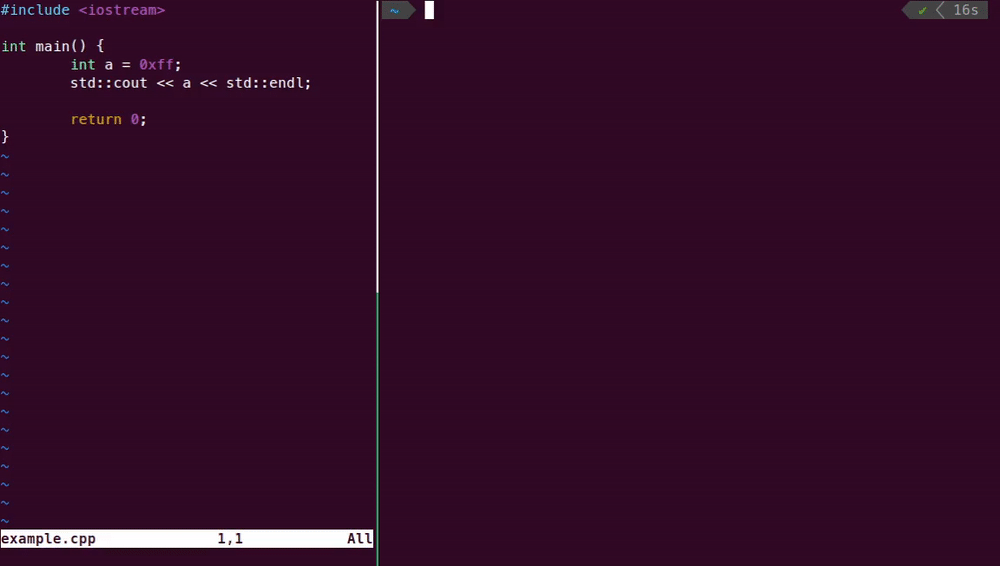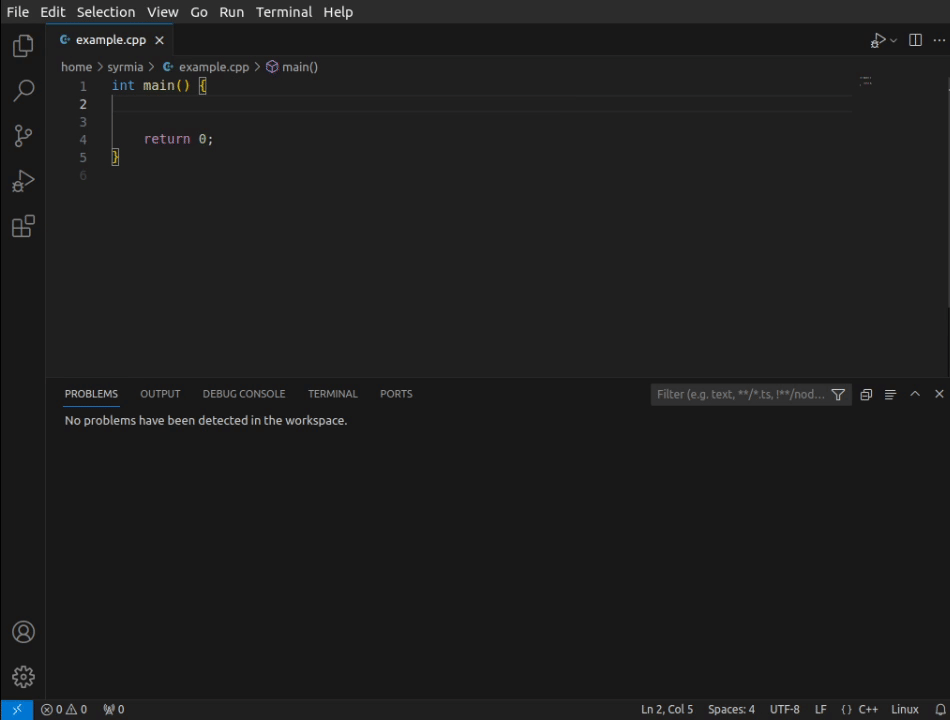Following AUTOSAR guidelines can be easy and free!
Autocheck is a source code analysis tool based on Clang / LLVM infrastructure.
Its main purpose is to check code against AUTOSAR guidelines for the use of the C++14 language in critical and safety-related systems. The main application sector of these guidelines is automotive, but these guidelines can be used in other embedded application sectors.
Autocheck is available as a plugin for VSCode. It shows AUTOSAR C++ rule violations in real-time as the user types code. Each violation is highlighted in the editor and a message showing the violated rule is displayed when hovering over the code as well as in the Problems panel.
- Ubuntu 20.04 or newer
- Debian 11 or newer
- C++ compiler (e.g. g++, clang++, ...)
- git
- cmake
- ninja
- python 3 (for tests)
These packages have to be available in your distributions package repository. If they are, they will be automatically installed. Otherwise, the tool will not work.
- glibc version 2.31 or newer
- libstdc++ development package version 10 or newer
To use the autocheck-dir and autocheck-genhtml scripts the following are required to be installed:
- python 3.8+
First clone the repository without submodules:
$ git clone https://github.com/syrmia/autocheck.git
$ cd autocheck
Since we use llvm-project as a submodule, we need to clone it as well:
$ git submodule init
$ git submodule update src/llvm-project
If you have access to the private autocheck-plugins repository, clone it as well. By default, this uses the HTTP protocol which requires a Personal Access Token with write access to the repository:
$ git submodule update src/tools/autocheck-plugins
If you want to use SSH instead, you can change the URL locally:
$ git config submodule.autocheck-plugins.url git@github.com:syrmia/autocheck-plugins.git
$ git submodule update src/tools/autocheck-plugins
Run the build.sh script located in the project root directory to automatically initialize the submodule, build llvm and build autocheck:
$ ./autocheck/build.shAfter the first build, you can just run ninja or ninja autocheck to compile again
- Create a build directory
$ mkdir build && cd build - Build LLVM/Clang
$ mkdir llvm && cd llvm $ cmake -G "Ninja" ../../autocheck/src/llvm-project/llvm \ -DCMAKE_BUILD_TYPE=Release \ -DLLVM_TARGETS_TO_BUILD="X86" \ -DLLVM_ENABLE_ASSERTIONS=ON \ -DLLVM_ENABLE_PROJECTS="clang" $ ninja $ cd ..
- Build autocheck
$ cmake -G "Ninja" ../autocheck -DCLANG_DIR="$PWD/llvm/lib/cmake/clang" $ ninja autocheck
After the first build, you can just run ninja or ninja autocheck to compile again
After building the project, from the build directory run:
cpack -G DEBThe generated package will be located in the same directory under the name autocheck_[version]_amd64.
Note: You should generate .deb packages only on a debian-based system, otherwise it might not work properly.
Note: The build should be performed on the oldest supported OS version to ensure glibc compatibility
Installation packages for Autocheck can be found in the releases section of the repository here.
Supports Ubuntu 20.04 and Debian 11 or newer.
To install the DEB package, run the following command:
sudo apt install ./autocheck_[version]_amd64.debor open it using your Software Manager and click Install.
If you built the tool run the following command from the build directory:
$ ./bin/autocheck [file]Otherwise, if you installed the tool, in any directory run:
$ autocheck [file]This will check compliance with all supported AUTOSAR rules in the given file. For more options and examples see the following sections.
| Flag | Description |
|---|---|
-W<rule> |
Enable the specified rule. For the full list of supported rules and their identifiers see AutosarRules or the --list-rules flag. By default all rules are enabled (same as -Wall). |
-Wno-<rule> |
Disable the specified rule. For the full list of supported rules and their identifiers see AutosarRules or the --list-rules flag. |
--check-between-lines=<from,to> |
Run autocheck only between given lines. |
--check-system-headers |
Check Autosar rules in system headers. |
--dont-check-headers |
Don't check Autosar rules in headers. |
--dont-check-macro-expansions |
Don't check Autosar rules in macro expansions. |
--extra-arg=<arg> |
Argument to append to the compiler (e.g. include directory, link directory, define...). |
--extra-arg-before=<arg> |
Argument to prepend to the compiler (e.g. include directory, link directory, define...). |
--warning-limit=<value> |
Set the limit of warnings per Autosar rule. By default, there is no limit. |
-p <build-path> |
Path to compile command database. For more information see the compilation database section. |
-o <file> |
Path to ouput file with a json extension. |
--output-type=<full|summary> |
Should output all diagnostics or just a summary. Default is full. |
--list-rules |
Display a list of supported rules and their identifiers. When this flag is present, all source files are ignored. |
Autocheck requires a compilation database file (compile_commands.json) to work on a file that is a part of a project, otherwise it can't resolve include directives.
You can find out how to generate this file for your project here.
If the compilation database is not specifed using the -p flag, autocheck will try to automatically find it.
It will first search the directory of the first input file and all of its parent directories.
If the file couldn't be found the following warning will be displayed:
Error while trying to load a compilation database:
Could not auto-detect compilation database for file "test.cpp"
No compilation database found in /path/to/input or any parent directory
fixed-compilation-database: Error while opening fixed database: No such file or directory
json-compilation-database: Error while opening JSON database: No such file or directory
Running without flags.
Let's look at the following code:
#include <iostream>
int main() {
int a = 0xff;
std::cout << a << std::endl;
return 0;
}Running autocheck without extra options checks all AUTOSAR rules in the given file and the files it includes:
$ autocheck example.cpp
=== Autocheck - Modern and Free Autosar checker
example.cpp:4:12: warning: Hexadecimal constants should be upper case [A2-13-5]
int a = 0xff;
^
example.cpp:4:2: warning: Fixed width integer types from <cstdint>, indicating the size and signedness, shall be used in place of the basic numerical types [A3-9-1]
int a = 0xff;
^
example.cpp:4:6: warning: Braced-initialization {}, without equals sign, shall be used for variable initialization [A8-5-2]
int a = 0xff;
^
example.cpp:4:6: warning: Constexpr or const specifiers shall be used for immutable data declaration [A7-1-1]
4 warnings generated.
You can specify which AUTOSAR rules to check:
$ autocheck -Wnon-braced-init-used example.cpp
=== Autocheck - Modern and Free Autosar checker
example.cpp:4:6: warning: Braced-initialization {}, without equals sign, shall be used for variable initialization [A8-5-2]
int a = 0xff;
^
1 warning generated.
or you can exclude certain rules by adding no- as a prefix to the flag:
$ autocheck -Wall -Wno-non-braced-init-used example.cpp
=== Autocheck - Modern and Free Autosar checker
example.cpp:4:12: warning: Hexadecimal constants should be upper case [A2-13-5]
int a = 0xff;
^
example.cpp:4:2: warning: Fixed width integer types from <cstdint>, indicating the size and signedness, shall be used in place of the basic numerical types [A3-9-1]
int a = 0xff;
^
example.cpp:4:6: warning: Constexpr or const specifiers shall be used for immutable data declaration [A7-1-1]
int a = 0xff;
^
3 warnings generated.
An AUTOSAR compliant version of the example looks like this:
#include <iostream>
int main() {
std::int32_t const a{0xFF};
std::cout << a << std::endl;
return 0;
}Runs autocheck on all C++ files in a folder and outputs the results to a specified folder.
From the scripts directory run:
python3 autocheck-dir/autocheck-dir.py [options] SCAN_DIR OUTPUT_DIR
Note: You will have to pass the path to the autocheck executable in your build directory using --autocheck-executable. Otherwise it will attempt to run an installed version of autocheck.
| Flag | Description |
|---|---|
-p <build-path> |
Path to compile command database. For more information see the compilation database section. |
-j --threads --workers |
Number of parallel workers. Uses all available logical CPUs by default. |
--output-type |
Should output all diagnostics or just a summary. Valid values: full (default), summary. |
--skip-existing |
Don't check files for which output already exists. |
--autocheck-executable |
Path to autocheck executable. If not specified, first available of the following is used:
|
--autocheck-flags |
Flags to pass to autocheck. |
--check-includes |
Report warnings from included files. |
--filter |
Regular expression to filter files to run autocheck on. |
--filter-out |
Regular expression to exclude files to run autocheck on. |
--extensions |
Comma separated list of file extensions to be filtered. Default: cpp, h, hpp. |
-v --verbose |
Show error output when compilation fails. |
-vv --echo-all-commands |
Echo all commands as they are executed to stdout. |
-q --quiet |
Show message only when compilation fails. |
Creates HTML reports from autocheck output files.
From the scripts directory run:
python3 autocheck-genhtml/autocheck-genhtml.py [options] INPUT OUTPUT
where INPUT is a path to autocheck output file or directory with autocheck output files, and OUTPUT is the ouput path.
It should be an html file if the input was a file and a directory is the input was a directory.
To generate a report for a project located in /opt/src run the following commands from the scripts directory:
python3 autocheck-dir/autocheck-dir.py --autocheck-executable="[autocheck_binary]" /opt/src /opt/autocheck_export
python3 autocheck-genhtml/autocheck-genhtml.py --open /opt/autocheck_export /opt/report
where [autocheck_binary] is the path to the compiled autocheck executable. This will generate and open a report page that looks like this:
You can navigate to different files and folders by clicking their names in the table and navigate back using the path displayed near the top of the page.
| Flag | Description |
|---|---|
-v --verbose |
Show warning messages. |
--clean-output-dir |
Empty the output directory before writing reports. Only works if outputting to a directory. |
--open |
Open report in a web browser. |
Autocheck uses LLVM Integrated Tester (lit). To execute tests run the following command from the build directory:
$ ninja check-autocheck- Implement more rules from the AUTOSAR C++ Guidelines
- Add support for MISRA C++ 2023 standard
- Make releases for Windows and Mac, but it should work as is
- ...
- Milena Vujosevic Janicic
- Vladimir Vuksanovic
- Djordje Todorovic
- Petar Jovanovic
- Mirko Brkusanin
- Milos Stojanovic
- Petar Avramovic
- Ognjen Plavsic
- Jelena Graovac
- Djordje Milicevic
- Djordje Curkovic
- Aleksandar Vracarevic


